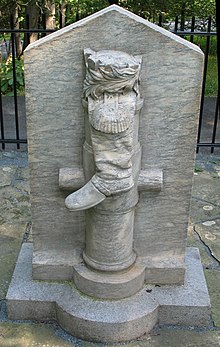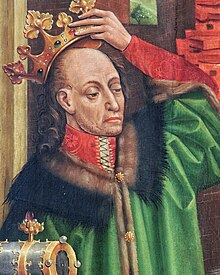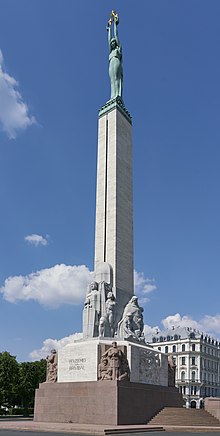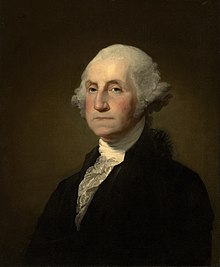Portal:History
The History Portal

Historia by Nikolaos Gyzis
History is the systematic study of the past. As an academic discipline, it analyzes and interprets evidence to construct narratives about what happened and explain why it happened, focusing primarily on the human past. Some theorists categorize history as a social science, while others see it as part of the humanities or consider it a hybrid discipline. Similar debates surround the purpose of history—for example, whether its main aim is theoretical, to uncover the truth, or practical, to learn lessons from the past. In a more general sense, the term history refers not to an academic field but to the past itself, times in the past, or to individual texts about the past.
Historical research relies on primary and secondary sources to reconstruct past events and validate interpretations. Source criticism is used to evaluate these sources, assessing their authenticity, content, and reliability. Historians integrate the perspectives of several individual sources to develop a coherent narrative. Different schools of thought, such as positivism, the Annales school, Marxism, and postmodernism, have distinct methodological approaches.
History is a broad discipline encompassing many branches. Some focus on specific time periods, such as ancient history, while others concentrate on particular geographic regions, such as the history of Africa. Thematic categorizations include political history, social history, and economic history. Branches associated with specific research methods and sources include quantitative history, comparative history, and oral history.
History emerged as a field of inquiry in antiquity to replace myth-infused narratives, with influential early traditions originating in Greece, China, and later in the Islamic world. Historical writing evolved throughout the ages and became increasingly professional, particularly during the 19th century, when a rigorous methodology and various academic institutions were established. History is related to many fields, including historiography, philosophy, education, and politics. (Full article...)
Featured picture
Did you know (auto generated)

- ... that BoysTown was reported as having the largest case of child abuse in Australia's history?
- ... that the Los Angeles Sparks have the most wins and highest winning percentage in WNBA history?
- ... that when Wilson Starbuck's play Sea Dogs was staged in 1939 it "contained some of the foulest language heard on Broadway" at that point in history?
- ... that Timo Meier became the first player in San Jose Sharks franchise history to score five goals in one game when he was 25?
- ... that the Harlem Park Three were awarded US$48 million, the largest sum in Baltimore history, after being falsely imprisoned for murder?
- ... that Joe Kraker was said to be the only lineman in football history to play without shoulder pads?
Thomas the Slav (Greek: Θωμᾶς, romanized: Thōmas, c. 760 – October 823) was a 9th-century Byzantine military commander, most notable for leading a wide-scale revolt in 821–23 against Emperor Michael II the Amorian (r. 820–829).
An army officer of Slavic origin from the Pontus region (now north-eastern Turkey), Thomas rose to prominence, along with the future emperors Michael II and Leo V the Armenian (r. 813–820), under the protection of general Bardanes Tourkos. After Bardanes' failed rebellion in 803, Thomas fell into obscurity until Leo V's rise to the throne, when Thomas was raised to a senior military command in central Asia Minor. After the murder of Leo and usurpation of the throne by Michael the Amorian, Thomas revolted, claiming the throne for himself. Thomas quickly secured support from most of the themes (provinces) and troops in Asia Minor, defeated Michael's initial counter-attack and concluded an alliance with the Abbasid Caliphate. After winning over the maritime themes and their ships as well, he crossed with his army to Europe and laid siege to Constantinople. The imperial capital withstood Thomas's attacks by land and sea, while Michael II called for help from the Bulgarian Khan Omurtag. Omurtag attacked Thomas's army, but although repelled, the Bulgarians inflicted heavy casualties on Thomas's men, who broke and fled when Michael took to the field a few months later. Thomas and his supporters sought refuge in Arcadiopolis, where he was soon blockaded by Michael's troops. In the end, Thomas's supporters surrendered him in exchange for a pardon, and he was executed. (Full article...)
On this day

- 1802 – German astronomer Heinrich Wilhelm Matthias Olbers discovered Pallas, the second asteroid to be identified, but at the time considered to be a planet.
- 1935 – The Nazi propaganda film Triumph of the Will, directed by Leni Riefenstahl, premiered in Berlin.
- 1942 – Second World War: The port of Saint-Nazaire in German-occupied France was disabled by British naval forces (ship pictured).
- 1946 – The US Department of State released the Acheson–Lilienthal Report, a proposal for the international control of nuclear weapons.
- 1979 – British prime minister James Callaghan was defeated by one vote in a vote of no confidence after his government struggled to cope with widespread strikes during the Winter of Discontent.
- 1999 – Kosovo War: Serbian police and special forces killed around 93 Kosovo Albanians in the village of Izbica.
- Ernst Lindemann (b. 1894)
- Nasser Hussain (b. 1968)
- Lady Gaga (b. 1986)
- Charles Schepens (d. 2006)
Selected quote
Even death is not to be feared by one who has lived wisely.
— Gautama Buddha, founder of Buddhism
Related portals
More Did you know...
- ... that the underground Fortress of Mimoyecques (pictured) was built by Nazi Germany to bombard London with 10 shells a minute using the V-3 supergun?
- ... that Howard P. Perry was the first African American recruit in the United States Marine Corps?
- ... that the Chester city walls form the most complete circuit of Roman and medieval defensive town walls in Britain?
- ... that China's first female director was adopted by the first Premier of the People's Republic of China?
- ... that the Medieval Merchant's House in Southampton was being used as a brothel when bomb damage during the Blitz revealed the building's important medieval architecture?
- ... that the Sumerian "river of paradise", the Hubur, derived partly from real geography before becoming a demonic fantasy?
- ... that Bill Foley's photograph "The Last Smile" shows Anwar Sadat only moments before his assassination?
- ... that the 1911 Sarez earthquake triggered a huge landslide, forming the tallest dam in the world?
Topics
Categories

History • By period • By region • By topic • By ethnic group • Historiography • Archaeology • Books • Maps • Images • Magazines • Organizations • Fictional • Museums • Pseudohistory • Stubs • Timelines • Chronology • People • Wikipedia historians
WikiProjects
![]() WikiProject History •
Ancient Near East • Australian History • Classical Greece and Rome • Dacia • Former countries • History of Canada • Chinese history • European history • Heraldry and vexillology • Indian history • Jewish history • Medieval Scotland • Mesoamerica • Military history • Middle Ages • History of Science
WikiProject History •
Ancient Near East • Australian History • Classical Greece and Rome • Dacia • Former countries • History of Canada • Chinese history • European history • Heraldry and vexillology • Indian history • Jewish history • Medieval Scotland • Mesoamerica • Military history • Middle Ages • History of Science
WikiProject Time • Days of the Year • Years
WikiProject Biography • Composers • Political figures • Saints • United States Presidents
Things you can do
 |
Here are some tasks awaiting attention:
|
Associated Wikimedia
The following Wikimedia Foundation sister projects provide more on this subject:
-
Commons
Free media repository -
Wikibooks
Free textbooks and manuals -
Wikidata
Free knowledge base -
Wikinews
Free-content news -
Wikiquote
Collection of quotations -
Wikisource
Free-content library -
Wikiversity
Free learning tools -
Wiktionary
Dictionary and thesaurus

![Image 1 Bombing of Dęblin airfield on 3 September 1939. Pictured: Irena (top)—the ghetto was centered on the semicircle—the airfield (right) and military installations (left). Thousands of Jews lived in the towns of Dęblin and Irena [pl] in central Poland before World War II; Irena was the site of the Polish Air Force Academy from 1927. In September 1939, the town was captured during the German invasion of Poland and the persecution of Jews began with drafts into forced labor and the establishment of a Judenrat ("Jewish Council"). A ghetto was established in Irena in November 1940. It initially consisted of six streets and was an open ghetto (the Jews were not allowed to leave without permission, but non-Jews could enter). Many ghetto inhabitants worked on labor projects for Dęblin Fortress (a German Army base), the railway, and the Luftwaffe. Beginning in May 1941, Jews were sent to labor camps around Dęblin from the Opole and Warsaw ghettos. Conditions in the ghetto worsened in late 1941 due to increased German restrictions on ghetto inhabitants and epidemics of typhus and dysentery. The first deportation was on 6 May 1942 and took around 2,500 Jews to Sobibór extermination camp. A week later, two thousand Jews arrived from Slovakia and hundreds more from nearby ghettos that had been liquidated. In October that same year, the Irena ghetto was liquidated; about 2,500 Jews were deported to Treblinka extermination camp while some 1,400 Jews were retained as inmates of forced-labor camps in the town. Unusually, the labor camp operated by the Luftwaffe—employing, at its peak, about a thousand Jews—was allowed to exist until 22 July 1944, less than a week before the area was captured by the Red Army. One of the last Jewish labor camps in the Lublin District, it enabled hundreds of Jews to survive the Holocaust. Some survivors who returned home were met with hostility, and several were murdered; all left by 1947. (Full article...)](http://upload.wikimedia.org/wikipedia/en/d/d2/Blank.png)






















































